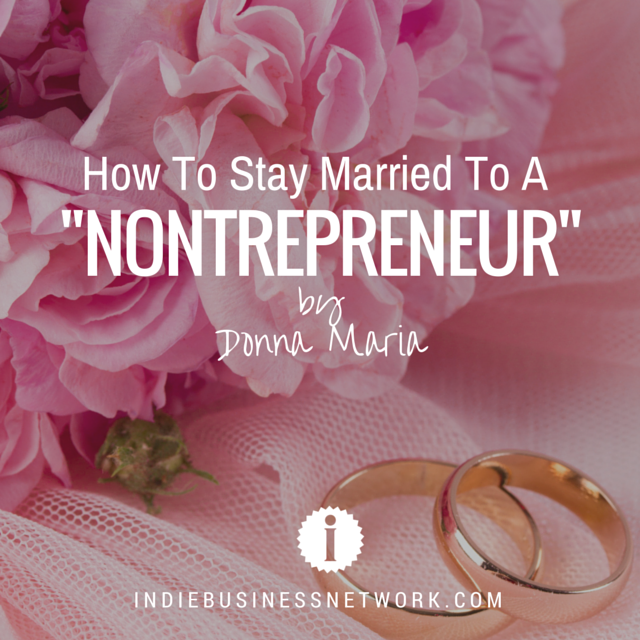Is you spouse or partner a “nontrepreneur?” If you've never heard that term before, it's because I made it up. A nontrepreneur is a person who is not an entrepreneur. I don't use that term to refer to people in “real life,” but I thought it was a fun sort of tongue-in-cheek way to describe my husband — who is not an entrepreneur. While the term can also apply to people who generally don't have the kind of “Type A” personality that most entrepreneurs have, for purpose of this post, I'm using it to describe a person who does not own a business of his or her own.

If you've read even a few posts at this blog, you know that I believe that entrepreneurship is the most amazing path to the ultimate lifestyle experience. You may also know that my husband helps me a lot in my business here at the Indie Business Network. What you may not know is that the fact that he is not an entrepreneur has sometimes caused friction in our relationship over the years.
Through many conversations with other married entrepreneurs, I have learned that our circumstances are not unique. The details of each situation varies, but the bottom line is that it is difficult for nontrepreneurs to be married to entrepreneurs, and it is difficult for entrepreneurs to be married to nontrepreneurs. This particular pairing seems to make marriage even more challenging than it already is, because the fundamental life outlook of an entrepreneur differs so greatly from the fundamental life outlook of a nontrepreneur. Sometimes, the more the entrepreneur's business succeeds, the more challenging the situation can become.
I have been in business the same number of years I have been married: fifteen. Throughout those years, as I have traveled my entrepreneurial journey and watched others travel theirs, I have discovered that certain things make entrepreneurial/nontrepreneurial unions work while other things rip them apart. This post shares five things I have learned to do that have helped me stay married to a nontrepreneur. I thought they might help you or some of your friends in a similar situations.
1. Accept and honor their choice
This is the first and most important action you must take if you are an entrepreneur who wants your marriage to a nontrepreneur to last.
This requires great strength and resolve on your part, especially when, as an entrepreneur, you think the choice for nontrepreneurship is not only wrong for them but also wrong for you. But, if you don't accept and honor their choice, your marital journey will be a whole lot harder. Ask me how I know.
If you do not think you can accept and honor their choice, you might as well leave now.
2. Do not live as though your choice is better than theirs
This is related to the honoring part, discussed above. If you truly accept their nontrepreneurial choice, you must be careful not to act like you are “truly living” and your nontrepreneurial partner is just chopped liver, “along for the ride.”
One way to look at it is that their choice is different from, not better than, yours. The decision for entrepreneurship is a very personal choice to take on a very grueling and personal lifelong journey. If someone does not want to take that journey, that's their choice. It's not a better choice than yours. It's not a worse choice. It's just their choice, and it's different from yours.
3. Do not try to force your entrepreneurial choice on them
People tend to naturally dig their heels in when they sense that someone is trying to change them or make them feel like they have to justify their existence.
As an entrepreneur, you probably dig your heels in when someone tries to make you feel like you have to explain yourself in order to be worthy of their acceptance. No one should have to do that. You are who you are, and that is enough. If that's good enough for you, surely it's good enough for the person you married.
”
Donna Maria, Indie Business Network
4. Include them in the entrepreneurial process
While my husband does not share my entrepreneurial choice, he does like to be included. This has been immensely helpful to me because I can count on him to help my business thrive. Whether it's being with our children so I can work extended hours on a project, taking a lead role in managing the household, or simply listening to a situation and making suggestions for how to handle it, my husband wants to be included. He understands that everything he does to help me is also helping my business.
It took us a very long time to achieve this equilibrium. Over the years, the more I have come to accept his nontrepreneurial choice, the more helpful and included in my entrepreneurial process he has become.
5. Get away when you need to
Over the years, my husband and I have learned that nothing relieves the pressure in our entrepreneurial/nontrepreneurial household like me getting away for a while.
Entrepreneurship requires a lot of time for quiet solitude and contemplation. Before you can execute anything and make it successful, you first have to plan it out, and that can be a very arduous and grueling process. Invest the resources (time, money, energy, etc.) to separate yourself from the pressures of home so you have the time you need to plan and lead your business into the future. This is one of the greatest gifts my husband gives to me today.
6. Decide to stay married
At the end of the day, only commitment can cause you to stay married. Even after you have done everything listed above, you still have to decide to stay married.
If you are like me, as an entrepreneur, you will probably choose to spend a great deal of time in your life around other entrepreneurs. This is a good an valuable thing. After all, when your livelihood depends on the continuous creation of new and innovative products and services, you must spend a lot of your time with other people who create and innovate for a living. If you are not married to a person whose creative energies flow like yours do, you've got to get that energy somewhere else, and that can be a challenge. But it can be done. Ask me how I know …
Question
Are you an entrepreneur who is married to a nontrepreneur? What do you think of these tips? Did I leave anything out? What works for you? I would love to know your thoughts and feedback in the comments below, or share on Facebook, Twitter and LinkedIn.



